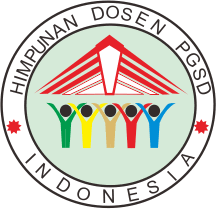Analisis kemampuan guru dalam menerapkan keterampilan dasar mengajar dalam pembelajaran ipas di sekolah dasar
Nitrata Rizqi Ag'yani Putri, Siti Istiyati Istiyati, Fadhil Purnama Adi
Abstract
This research aims to describe teachers' knowledge and application of basic teaching skills. In this research, researchers used a qualitative approach with the phenomenological method. The data sources in this research were class IV teachers and class V teachers at SD Negeri Karangasem 2. The sampling technique used non probability sampling, namely purposive sampling. The data collected in this research used observation, tests, interviews, questionnaires and documentation. Test the validity of the data using source triangulation and technique triangulation. The data analysis used in this research is the Miles and Huberman model data analysis. The results of this research are that the fourth grade teacher's learning opening and closing skills, the results of the knowledge test have a percentage of 91.6% and the results of the application of teaching skills have a percentage of 83.3%. For class V teachers, the knowledge test results had a percentage of 91.6% and the application results had a percentage of 83.3%. In the fourth grade teacher's questioning skills, the knowledge test had a percentage of 83.3% and the results of applying questioning skills were 91.6%. For class V teachers, the knowledge test results were 91.6% and the application results percentage was 91.6%. In terms of skills for strengthening learning, class IV teachers' knowledge test results have a percentage of 75% and the results of applying teaching skills have a percentage of 83.3%. For class V teachers, the knowledge test results had a percentage of 91.6% and the application results had a percentage of 75%. Regarding the skills of implementing variations in learning for class IV teachers, the results of the knowledge test have a percentage of 91.6% and the results of the application of teaching skills have a percentage of 75%. For class V teachers, the knowledge test results had a percentage of 91.6% and the application results had a percentage of 83.3%. In class IV teachers' learning classroom management skills, the knowledge test results had a percentage of 91.6% and the percentage of results for the application of teaching skills was 83.3%. For class V teachers, the knowledge test results had a percentage of 91.6% and the application results had a percentage of 83.3%. In terms of skills in guiding small group discussions for class IV teachers, the results of the knowledge test were 91.6% and the results of the application of teaching skills were 83.3%. For class V teachers, the knowledge test results had a percentage of 91.6% and the application results had a percentage of 91.6%. Regarding the skill of explaining learning for class IV teachers, the results of the knowledge test have a percentage of 83.3% and the results of the application of teaching skills have a percentage of 83.3%. For class V teachers, the knowledge test results had a percentage of 91.6% and the application results had a percentage of 91.6%. In terms of group teaching skills and individual learning for class IV teachers, the results of the knowledge test had a percentage of 83.3% and the results of the application of teaching skills were a percentage of 83.3%. For class V teachers, the knowledge test results had a percentage of 91.6% and the application results had a percentage of 91.6%. The conclusion from the results of the tests and questionnaires obtained by the researchers is that teachers have good knowledge of teaching skills and their application has been implemented well, but there are skills that are lacking in their application, such as the skill of providing variations.
Keywords
Knowledge, Application, Skill, Teach.
References
Zuhri, M. S. (2019). Suluk jalan terabas Gus Miek untuk meraih kebahagiaan: studi terhadap Jemaah Dzikrul Ghofilin Gayungan Surabaya. UIN Sunan Ampel Surabaya. [2.] Agung, Leo. Nunuk Suryani. 2012. Strategi Belajar Mengajar. Yogyakarta: Penerbit Ombak [3.] Mulyasa. 2015. Menjadi Guru Profersional Menciptakan Pembelajaran Kreatif Dan Menyenangkan. Bandung: PT Remaja Rosdakarya. [4.] Farida Trisnayanti.2013. Analisis keterampilan mengajar aspek menjelaskan mahasiswa pendidikan matematika dalam mata kuliah pengajaran mikro (micro teaching) didasarkan pada teori metakognitif (Penelitian Dilakukan di Program Studi Pendidikan Matematika FKIP UNS Tahun Ajaran 201. UNS-FKIP Jur. Pendidikan Matematika-K.1309029-2013. [5.] Riyadhotul Mukaromah.2023.Penerapan Model Problem Based Learning (PBL) dengan Media Audio Visual untuk Meningkatkan Pembelajaran IPAS Materi Kerajaan-kerajaan di Nusantara Pada Siswa Kelas IV SDN 1 Adiarsa Tahun Ajaran 2022/2023. Surakarta - Fak. KIP – 2023 [6.] Ika Rahmawati.2023.Penerapan Model Pembelajaran Problem Based Learning Menggunakan Media Pop-Up Book dalam Peningkatan Pembelajaran IPAS tentang Indonesiaku Kaya Budaya pada Siswa Kelas IV SDN Gadungrejo Tahun Ajaran 2022/2023. Surakarta - Fak. KIP - 2023. [7.] Bastian. (2019). Analisis keterampilan dasar mengajar guru dalam melaksanakan pembelajaran di sekolah dasar. Jurnal Pendidikan dan Pengajaram. [8.] Marno, Idris (dalam Sholikin). 2018. Keterampilan Guru Bahasa Inggris Aliyah Dalam Membuka dan Menutup Pelajaran. Jurnal Diklat Keagamaan, Vol 12, No. 2. [9.] Alma, Buchari.(2010). Guru Profesional : Menguasai Metode dan Terampil Mengajar. Bandug:Alfabeta. [10.]Asril, Zainal. 2010. Micro Teaching. Jakarta: PT. Rajagrafindo Persada [11.]Mulyasa. 2015. Menjadi Guru Profersional Menciptakan Pembelajaran Kreatif Dan Menyenangkan. Bandung: PT Remaja Rosdakarya. [12.]Sundari, Siti Fitri, Muliyawati Yuli. 2017. Analisis Keterampilan Dasar Mengajar Mahasiswa PGSD. Jurnal Ilmiah Pendidikan. Vol 1 No 1 (26-36). [13.]Suwarman, Ujang. 2004. Perilaku Konsumen Teori dan Penerapannya dalam Pemasaran. Bogor: PT Ghalia Indonesia. [14.]Tasya Laititia, Nur Ngazizah.2021. Evaluasi Keterampilan Mengajar Kelompok Kecil Dan Perseorangan Mahasiswa Pgsd Semester Vi Mata Kuliah Pembelajaran Mikro 2020/2021. Jurnal Dharma PGSD. Vol 1 No 2 [15.]Rusman. (2017). Belajar dan Pembelajaran :Berorientasi Standar Proses Pendidikan .Cetakan Pertama. Jakarta:PT. Kharisma Putra Utama



